

Avoiding Plagiarism and Lazy Writing. Students are often confused about how to use materials from sources (e. g., journals and books) that they read.
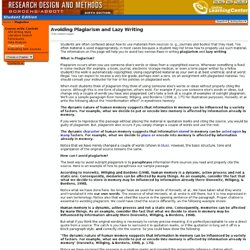
Too often material is used inappropriately, in most cases because a student may not know how to properly use such material. The information on this page will help you to avoid two serious flaws in writing plagiarism and lazy writing . What is Plagiarism? Plagiarism occurs when you use someone else's words or ideas from a copyrighted source.
Whenever something is fixed in some medium (for example, a book, journal, electronic storage medium, or even a term paper written by a fellow student) the work is automatically copyrighted. When most students think of plagiarism they think of using someone else's words or ideas without properly citing the source. The dynamic nature of human memory suggests that information in memory can be influenced by a variety of factors. The dynamic character of human memory suggests that information stored in memory can be acted upon by many factors. OWL. Contributors:Purdue OWL.Summary: This resource discusses how to paraphrase correctly and accurately.
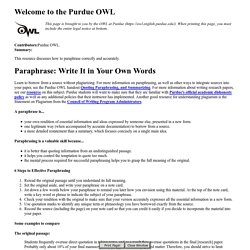
Learn to borrow from a source without plagiarizing. For more information on paraphrasing, as well as other ways to integrate sources into your paper, see the Purdue OWL handout Quoting Paraphrasing, and Summarizing. For more information about writing research papers, see our resource on this subject. Purdue students will want to make sure that they are familiar with Purdue's official academic dishonesty policy as well as any additional policies that their instructor has implemented.
A paraphrase is... How to Write in Your Own Words: 7 Steps. Expert Reviewed Three Methods:Learning to ParaphraseQuoting EffectivelyBuilding Your Writing Tool-kitCommunity Q&A Writing a strong essay combines original composition with the incorporation of solid research.

Taking the words and ideas of others and weaving them seamlessly into your essay requires skill and finesse. By learning how to paraphrase, exploring how and when to incorporate direct quotes, and by expanding your writing tool-kit more generally, you will be well on your way to writing effectively in your own words. Steps Method 1 Learning to Paraphrase <img alt="Image titled Write in Your Own Words Step 1" src=" width="728" height="546" class="whcdn" onload="WH.performance.clearMarks('image1_rendered'); WH.performance.mark('image1_rendered');">1Understand the passage.
6 Reasons to Write in Your Own Words — Plagiarism Checker. “Be sure to write it in your own words,” is a mantra that is repeated by educators at all academic levels.

For students, the idea of writing in one’s own words is repeated from the first paragraphs written in grade school all the way to a doctoral thesis. In the age of the Internet, almost any piece of knowledge or idea can be found, copied and presented in a matter of minutes. If being able to find the knowledge is what is most important, the extra step of rewriting what others have done seems superfluous.
So, why do instructors and publications care if something is written in original words, even if the sources are properly cited? While the Internet is a tool to find “the right words”, there are several reasons to put ideas and thoughts in one’s own voice. Here are six reasons it is important to use one’s own words when writing. 1. When copying the words of someone else, nothing new is created and nothing is contributed to the larger discussion. 2. 3.
Avoiding Plagiarism: Quoting and Paraphrasing. General advice When reading a passage, try first to understand it as a whole, rather than pausing to write down specific ideas or phrases.
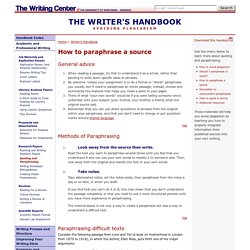
Be selective. Unless your assignment is to do a formal or "literal" paraphrase, you usually don? T need to paraphrase an entire passage; instead, choose and summarize the material that helps you make a point in your paper. Think of what "your own words" would be if you were telling someone who's unfamiliar with your subject (your mother, your brother, a friend) what the original source said.
Top Methods of Paraphrasing Look away from the source then write. If you find that you can't do A or B, this may mean that you don't understand the passage completely or that you need to use a more structured process until you have more experience in paraphrasing. Summarizing, Paraphrasing, and Quoting § Harvard Guide to Using Sources. Depending on the conventions of your discipline, you may have to decide whether to...
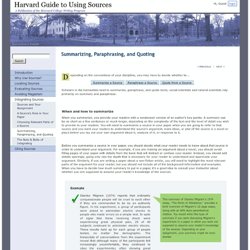
Summarize a Source Paraphrase a Source Quote from a Source Scholars in the humanities tend to summarize, paraphrase, and quote texts; social scientists and natural scientists rely primarily on summary and paraphrase. When and how to summarize When you summarize, you provide your readers with a condensed version of an author's key points. A summary can be as short as a few sentences or much longer, depending on the complexity of the text and the level of detail you wish to provide to your readers. Before you summarize a source in your paper, you should decide what your reader needs to know about that source in order to understand your argument.
Example This summary of Stanley Milgram's 1974 essay, "The Perils of Obedience," provides a brief overview of Milgram's 12-page essay, along with an APA style parenthetical citation. Paraphrase Exercises. How to avoid plagiarizing? How to Summarize. How Not To Plagiarize. Tips to avoid Accidental Plagiarism. Writing From Sources: Quotation, Paraphrase, and Plagiarism.
Avoid Plagiarism: Quoting, Paraphrasing, and Summarizing. Good writing takes time.
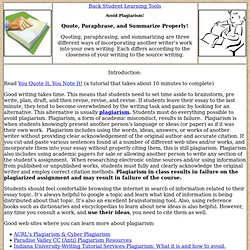
This means that students need to set time aside to brainstorm, pre write, plan, draft, and then revise, revise, and revise. If students leave their essay to the last minute, they tend to become overwhelmed by the writing task and panic by looking for an alternative. This alternative is usually plagiarism. Students must do everything possible to avoid plagiarism. Plagiarism, a form of academic misconduct, results in failure. Students should feel comfortable browsing the internet in search of information related to their essay topic. 1) Print everything!
2) Photocopy everything! Author—Creator or compiler of the information; for web sites this may be the Webmaster or the owning organization. How to Avoid plagiarism in research papers by paraphrasing « Humanities. How to use and cite sources in Biology. Paraphrasing, Patchwriting, Direct Quotes. A Quick Guide To Plagiarism. 10 Types of Plagiarism.